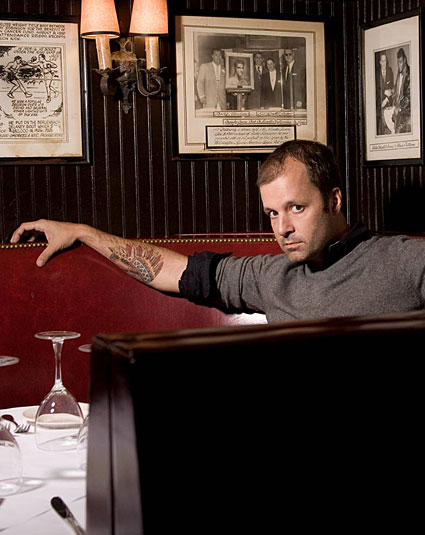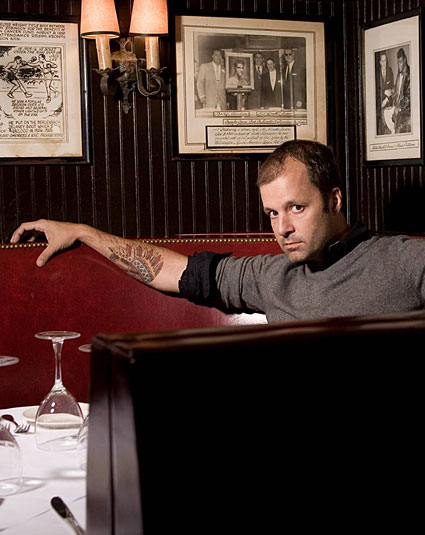 Rare breed: Patrick Martins moves old-school meat.(Les Meyers photo)After founding Slow Food USA in 2000, Patrick Martins went on to cofound Heritage Foods USA, a nationwide purveyor of meat from sustainably raised, heritage-breed animals, which he continues to head. And every Sunday, he records a radio show & podcast, The Main Course, from New York City.
Rare breed: Patrick Martins moves old-school meat.(Les Meyers photo)After founding Slow Food USA in 2000, Patrick Martins went on to cofound Heritage Foods USA, a nationwide purveyor of meat from sustainably raised, heritage-breed animals, which he continues to head. And every Sunday, he records a radio show & podcast, The Main Course, from New York City.
Knowing he’s a man of strong opinions, Grist recently asked him by email for his take on some current trends in the sustainable food world.
Q. When did your passion for good food begin?
A. When I began eating three meals a day. As [Slow Food International founder] Carlo Petrini says, what goes into you becomes part of you, so you should respect what you eat.
Q. How did Slow Food USA and Heritage Foods come into being?
From time spent in Italy with Petrini, watching him meet with farmers, the heads of his various offices, and members of the press. I was impressed and understood that the USA needed Slow Food and especially its Ark of Taste project. Then, as I traveled to the U.S. to visit some of our then-100 Slow Food USA chapters, I met many farmers desperate to get paid what they deserved for raising food the right way.
Q. Why does your company focus on heritage breeds, older breeds that industry has moved beyond?
A. Genetic diversity is important from a food-safety perspective, being more resistant to pathogens, man-made or natural. Heritage breeds also represent mankind’s greatest achievement to make great tasting meat. Heritage breeds have long histories connected to locales and the families who live there.
Q. A gastronome like you believes that one should always purchase the best-quality food, regardless of where it’s from. How big a role does ‘local’ play in your purchasing decisions, if any?
A. If local food tastes better and is priced competitively, then local should be the way. If it’s not, it should not be the way. Should someone drink bad wine because it’s local? That being said, it’s important to support local producers so that they get to be the best.
The gastronomic merits of a food can be affected by distance. The more a food travels, the worse it may taste — but that’s also not necessarily so. Carlo believes in letting his mouth answer that question, not the odometer on the truck that brought it to him. He always wants the best of the best, no matter where it came from in Italy, but he also helps local producers achieve high standards, too, so that they could be the best.
Q. There’s a lot of buzz lately about creating mobile slaughter units to help farmers serve the market for sustainable meat. What’s your take on this trend?
A. Mobile slaughter units are popular because the real solution is too hard to grapple with for many people: we need real slaughterhouses that can grow markets and demand. Slaughtering 10 animals a day is a temporary solution. A thousand animals a day is where we need to be.
Investors in this country have failed to take the plunge and invest in slaughterhouses. They’ve been considered “risky” investments. I think part of this is the effect the vegetarian movement still has on us — and PETA. What is sad is that while no investments are made, and while PETA and Paul McCartney expand their discourse, billions of animals are suffering at major slaughter factories. We are offering no alternative, while meekly avoiding the issue that Americans eat tons of meat a day. We eat it, so we have to deal with the issue. While major crimes against God’s creatures are being committed, we are standing by because the solution is “too complicated.”
We should look at Purdue and Smithfield and ConAgra as what they really are — the enemies of the sustainable food world. They’re the ones that we must change, make more humane and more sustainable. It’s companies like those that feed the world. The heart of the bell curve is where the battle exists.
Q. So what do you prescribe?
A. It’s very hard to run a large slaughter facility well. But many people, like Dan Purdy in New York and Mario Fantasma in Trimble, Missouri, show it can be done.
There’s a disconnect between people who care and people who don’t. If people who cared acted on the issue of humane slaughter, alternatives would pop up everywhere. If we can land a man on the moon, we should be able to open a facility that processes animals humanely outside every major city in the nation.
We should not wait for, or expect, rules to change. We must force those changes by acting ourselves. If four slaughterhouses were opened in the Bronx that met all rules and regulations, however draconian, the government would be forced to reckon with this movement. Action creates change.
Q. What’s the incentive? How big is the market for sustainable meat?
A. The market is as big as we can make it. The main obstacle is the commodity pricing being paid to farmers for meat. It’s not a fair price — it’s determined by companies who care little for taste, health, or animal and farmer rights. The overriding concern of all good, clean, and fair farmers in the US is getting paid a fair price to produce quality, healthy food.
Q. Speaking of prices, why is Heritage Foods USA a for-profit company versus a nonprofit?
A. Nonprofits are not necessarily a good thing for this new food movement. Good farmers need success in the business world, not charity. They must be paid well, like doctors and lawyers. We are a for-profit and spend less than 10% of our income on overhead. We put $70,000 a week into the pockets of small farmers. That is how successful organizations should be judged: by how much they put into the pockets of the people who this movement is about.
Heritage Foods USA processes 175 pigs a week, every week of the year. These pigs are antibiotic-free, genetically pure, and pasture-raised. We also process about 50 head of cattle a year and about 7,500 turkeys.
To farmers I would say, Read what is written on the side of [food distributor giant] Sysco’s trucks: Service you can count on. They say nothing of quality or taste — they just say they deliver! Small farms must deliver consistently if they expect to succeed. To help in that cause, I say work in groups and don’t fear middlemen, so long as there are few of them.
Q. I’ve also heard you say that prepared food is the best way to fight the obesity epidemic. Explain why?
A. Fast food dominates for a reason: it gives people what they want, in a way they want it. I guarantee you that fast food enterprises that sell “slow” food will have a larger effect much sooner than if we expect this country to turn into one that cooks at home 7 days a week.
And slow food is not more expensive than fast food. A value meal at McDonalds costs $7 in New York City. [Grist note: It does! $6.85 — we called one.] Chefs around the country are often beating that price with sustainable meatballs, hot dogs, and hamburgers. We must stop calling ourselves elitist if we are not necessarily so.



